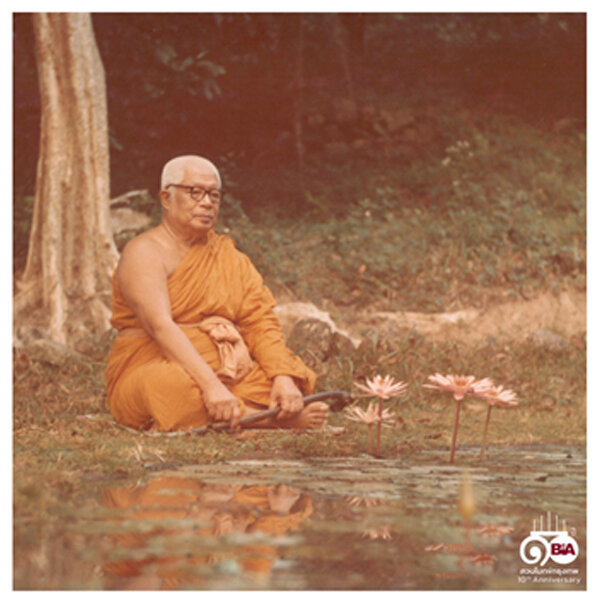

Why the Monkeys Washed out Their Ears
“Does ānāpānasati explore the subconscious mind in any way?”

Everything Is ‘Correct’
On a bitterly cold night in December 1980, seated on the wicker seat under his kuti, Ajahn Chah gave a Dhamma talk to his Western disciples. As I sat amongst his audience on the frigid floor that night in my thin cotton robe, struggling not to shiver, I was in heaven.

Food for Thought #38
True Buddhists must maintain that the body resides in the mind and that spiritual nourishment is more important than physical sustenance; they must care about all doctrines that advocate a spiritual quest. Practicing Buddhism by means of lip service or rituals does not make you a Buddhist. True Buddhists will not become materialistic nor overly nationalistic.

Q43. Where do joy and suffering originate?
It is generally said that happiness and suffering arise from previous kamma (actions). This is the least correct answer.

Why the Monkeys Washed out Their Ears
“Can you explain your own experience of ‘not-me’? Or is it an inference you have deduced from your experience of ‘not mine’?”

Letting Go
The heart of our practice lies in letting go. Through our training in silā, we let go of unwise actions and speech. Through our training in samādhi, we let go of the hindrances. Through our training in paññā, we let go of the attachments that conceal the true nature of things, and that bind us to the wheel of birth-and-death.

Food for Thought #37
As long as Buddhists still care about the quest for spiritual happiness, we can say that the family line of the Buddha will remain unbroken. This spiritual quest will function like a plumb, giving direction and remaining poised for its own safety and that of the world - even though there are others who detest those on the spiritual path.

Q42. How much interest do psychic powers deserve?
First of all, we shall say something about the iddhis themselves. The word iddhi means ‘power.’ It was originally an everyday word, a household term applied to things with the ability to promote success in perfectly ordinary ways.

Intuitive Awareness
‘Awareness is your refuge: Awareness of the changingness of feelings, of attitudes, of moods, of material and emotional change. Stay with that, because it’s a refuge that is indestructible. It’s not something that changes. It’s a refuge you can trust in. This refuge is not something you create. It’s not a creation. It’s not an ideal. It’s practical and very simple but easily overlooked or not noticed. When you’re mindful, you’re beginning to notice: it’s like this.’

Why the Monkeys Washed out Their Ears
My question is although I understand ‘not mine,’ I am confused by ‘not-self.’ So far in this course, the distinction between ‘not me’ and ‘not mine’ has not really been made – they’re generally mentioned at the same time. Is it usual to experience one without the other?”

Mindfulness of Speech
Mindfulness of speech is a challenging practice, because at the same time that we try to be aware of our own speech we also have to try to be aware of our reactions to the other person’s speech.
Our responses to the person we are talking to may be improved by memorising the following checklist.

Food for Thought #36
When the world discards the quest for spiritual sustenance and progressively seeks more and more physical pleasure, as people are doing today, Lord Buddha cannot be of any help.

Q41. Where is the happy destination? Where can we dwell in happiness?
In the early texts, there is a passage that speaks of celestial beings (devatā) dying, passing away, coming to the end of their merit and life spans. It also tells of their wishing to attain the happy destination, seeking for it, and wishing to know where to find it.

Why the Monkeys Washed out Their Ears
Enlightened people are said to keep staying alive because of their commitment to help others to overcome suffering. Would this be an example of selfless attachment? What keeps the commitment from fading away?

Being Awake
Meditation is the cultivation of wakefulness. It begins with us learning how to be awake to our meditation object, moment by moment. As it progresses we learn to be awake to the whole of our body and mind.

Food for Thought #35
Lord Buddha was the foremost leader of a community of people in search of spiritual happiness in a bygone era. He is known as the "Great One," and he has become a refuge to people in later times because of the power of the Dhamma.

Q40. Where is great goodness found?
The Buddha once said, ‘Developing awareness-of- impermanence (anicca-saññā) for only as long as it takes to click the fingers has more effect and value than providing meals for the entire Saṅgha when led by the Buddha himself.’

Why the Monkeys Washed out Their Ears
You said that desire creates the desirer if there is no right mindfulness. Does this mean that there is already attachment, or is attachment a later development?

A Few Thoughts on Obstacles
Be flexible in your approach. Ajahn Chah once said: ‘If obstacles come low, jump over them. If they come high, duck under them.

Food for Thought #34
Those in search of spiritual happiness should be fair to others saying, "we are a balancing force holding you back from running into the fire too quickly. If we were to become like you, you can be sure that the world would disintegrate even faster - this is why we have decided to stay the course of our vocation."
